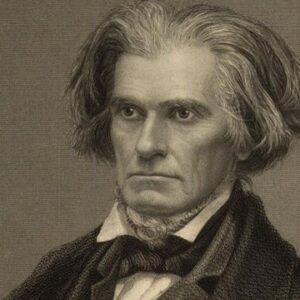John C. Calhoun was an American politician who served as the United States’ seventh Vice President. He served from 1825 to 1832, first under John Quincy Adams and then under Andrew Jackson. Calhoun was born in South Carolina to a farmer and studied law after graduating from Yale College. Calhoun entered politics later in life and served in the South Carolina legislature before being elected to the United States House of Representatives, a position he held for three terms. Calhoun served as Secretary of War under President James Monroe from 1817 to 1825 and then ran for the presidency in the 1824 election but later withdrew his name and ran unopposed for the vice presidency. Thus, Calhoun was appointed Vice President of the United States by John Quincy Adams and later re-elected by Andrew Jackson in 1828. Calhoun was a supporter of states’ rights and nullification, and Jackson’s support for the Tariff of 1828 caused a schism between Calhoun and Jackson, ultimately resulting in Calhoun’s resignation as the first vice president. Calhoun was re-elected to the Senate following his resignation and also served as Secretary of State for a time. Calhoun was a staunch supporter of slavery, and during his final years in the Senate, he was a leading voice for those seeking to preserve the institution.
Childhood & Adolescence
John Caldwell Calhoun was born in Abbeville District, South Carolina, United States, on March 18, 1782, to Patrick Calhoun, a Scots-Irish farmer, and his wife, Martha Caldwell. John was the fourth child of his parents, who migrated from Pennsylvania to the Piedmont region of North Carolina.
John dropped out of school at the age of 17 due to his father’s illness and began working on the family farm. Later in life, he decided to finish his studies and graduated from Yale College in 1804.
Following that, he attended Tapping Reeve Law School and was admitted to the South Carolina bar in 1807. Later in life, after marrying, John renounced his practice and became a planter-statesman.
Career of John
Calhoun was elected to the South Carolina state legislature in 1808 and served for one year. In 1811, he was appointed to the United States House of Representatives as a Democratic-Republican, a position he held until 1817. He chaired the House Foreign Relations Committee and served as Speaker Henry Clay’s chief lieutenant.
Calhoun began his political career as a nationalist and was one of the leading War Hawks who played a critical role in luring an unprepared United States into war with Great Britain. Calhoun introduced the declaration of war on Britain in 1812.
Calhoun served as Secretary of War under President James Monroe from December 1817 to March 1825. Calhoun reorganized and modernized the National Military Academy during his tenure.
Calhoun ran for President of the United States in 1824 alongside four other candidates but later withdrew. Calhoun then ran unopposed for vice president with Andrew Jackson’s support, and was inaugurated as the 7th Vice
President of the United States under John Quincy Adams in March 1825. Calhoun was re-elected to the vice presidency in 1828, during Andrew Jackson’s administration. Calhoun founded the Nullifier Party the following year in response to Congress’s passage of the ‘Tariff of Abominations.’ It was a states’ rights party that argued that states should have the authority to invalidate federal laws within their borders.
Calhoun and President Jackson had a tense relationship during Calhoun’s second term as Vice President, as Jackson supported an increase in the protective tariff, which Calhoun saw as a favor to northern manufacturing interests over southern agricultural interests. Calhoun resigned from the vice presidency in December 1832, following much debate over the matter.
Calhoun was immediately elected to the United States Senate from South Carolina, where he served until March 1843 and then again from 1845 to 1850. As a Democrat, Calhoun led the Senate’s pro-slavery faction and opposed efforts to rein in slavery’s expansion into the western territories.
President John Tyler appointed Calhoun Secretary of State in April 1844; he served for nearly a year. Calhoun worked for the annexation of Texas and the settlement of the Oregon-Great Britain border during his tenure.
Calhoun was re-elected to the Senate in 1845 and voted against the Mexican-American War and the admission of California as a free state. He spent his final years in the Senate attempting to unite the South against the abolitionist attack on slavery.
Significant Works of John
Calhoun assisted in the establishment of the Second Bank of the United States following the War of 1812. He chaired the committees that introduced legislation creating a permanent road system, a standing army, and a modern navy.
Calhoun objected to the 1828 Tariff of Abominations, arguing that it was unfairly assessed on the agrarian South, benefiting the industrializing North.
As a result, he drafted his ‘South Carolina Exposition and Protest,’ in which he proposed the theory of concurrent majority via the doctrine of nullification.
Personal History and Legacies
John Calhoun married Floride Bonneau Calhoun, a cousin, in 1811. The couple had ten children, three of whom died in infancy.
John Calhoun died on March 31, 1850, in Washington, D.C., at the age of 68, from tuberculosis. He was laid to rest in Charleston, South Carolina’s St. Philip’s Churchyard.
Estimated Net Worth
John C Calhoun’s net worth or net income is estimated to be between $1,000,000 and $2,000,000. He amassed such wealth through his primary career as a politician.


